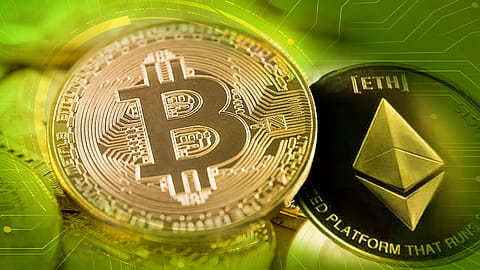Crypto policy with FinMin; needs global collaboration: MoS Pankaj Chaudhary
Any legislation can be effective only with significant international collaboration on the evaluation of risks and benefits, says Pankaj Chaudhary.

Minister of State in the Ministry of Finance Pankaj Chaudhary today said the policy related to crypto assets and related ecosystems is currently with the Ministry of Finance. He was speaking on the current status of the cryptocurrency bill in the country, and the timeframe within which it would be tabled and subsequently be open for public inputs.
"Crypto assets are by definition borderless and require international collaboration to prevent regulatory arbitrage. Therefore, any legislation on the subject can be effective only with significant international collaboration on evaluation of the risks and benefits and evolution of common taxonomy and standards," he said in the Lok Sabha.
Earlier, Finance Minister Nirmala Sitharaman, before concluding her six-day visit to the U.S. in October, had said in Washington D.C. that India's one of the agendas during the G20 presidency is to develop standard operating procedures (SoPs) for cryptocurrency.
The finance minister said India would want to place the agenda on crypto before the G20 table for discussion and aim for a tech-driven regulatory framework. "We would definitely want to collate all this and do a bit of study and then bring it on to the table of the G20 so that members can discuss it, and hopefully arrive at a framework or SoP so that globally, countries can have a technology-driven regulatory framework."
Considering the volatility and risks associated with crypto, the government has called for international collaboration on crypto and tighter reforms in the country. In the Union budget 2022-23, the central government proposed to tax the gains made on virtual digital assets at 30% and 1% TDS on the transfer of cryptos to discourage transactions in crypto.
On the use of banks’ use of blockchain, which forms the basis of crypto, the FM last week told the Rajya Sabha recently that only a few banks are using blockchain technology on a small scale. "The RBI has been providing guidance for the development of the blockchain-based application through its mechanism for testing of innovative technologies, products and services, known as Regulatory Sandbox. Blockchain technology has been listed as one of the innovative technologies in this regard, where innovators can apply to test their products through this mechanism."
She, however, said there’s no proposal to prescribe a common model technology platform for the banks.
Recommended Stories
Notably, the Reserve Bank of India (RBI), which is working on its own blockchain-based digital currency (CBDC), launched the first pilot of the retail digital rupee, also known as e₹-R, on December 1, 2022. The digital token that represents legal tender will be issued in the same denominations that paper currency and coins. The scope of the pilot will be increased gradually to include more banks, users and locations. The RBI's pilot on the digital rupee will test the robustness of the new system.